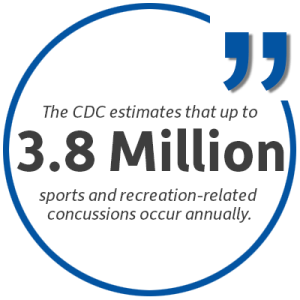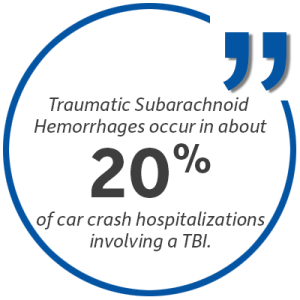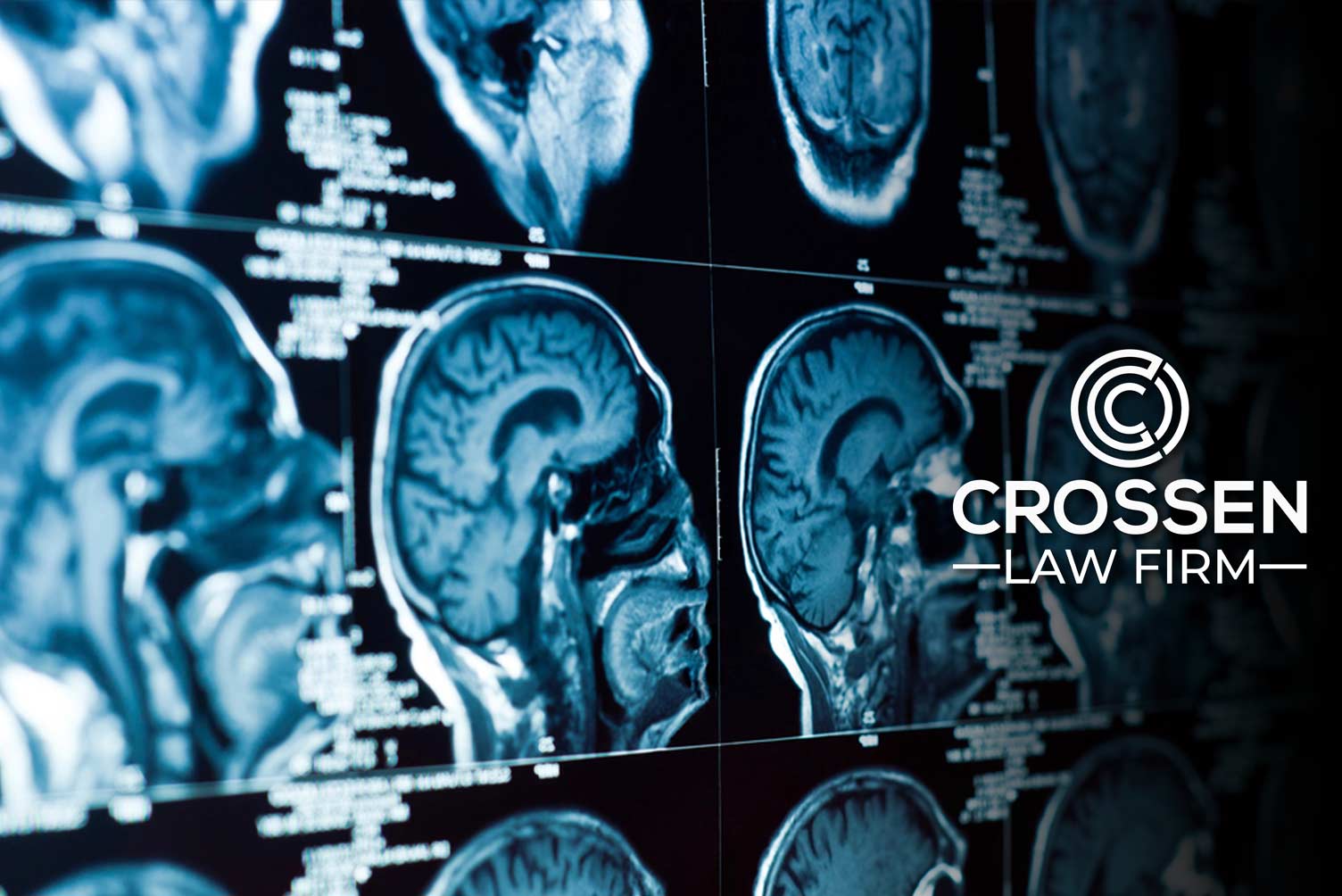Car accidents are a leading cause of traumatic brain injuries (TBIs), which can result in life-altering consequences. If you or a loved one suffered a brain injury in a crash, understanding your legal options can help you seek justice and get the support you need.
Types of Brain Injuries from Car Accidents

Several types of brain injuries commonly occur in auto collisions when the head forcefully strikes part of the vehicle or brain tissue is impacted by the jolting motion. Common car crash brain injuries include:
Concussion: Concussions represent the mildest form of TBI, involving temporary dysfunction rather than structural damage. Symptoms include headache, confusion, and loss of consciousness. The CDC estimates that 1.6 to 3.8 million sports and recreation-related concussions occur annually. But concussions are also very common in crashes. Even mild concussion symptoms can persist for months.
Contusion: Contusions refer to bruising of brain tissue, leading to swelling, inflammation, and possible bleeding. Contusions and bruising commonly develop when the brain collides with the interior skull in crashes. These can impair neural function.

Diffuse Axonal Injury (DAI): While harder to diagnose, DAI may happen in over half of car accident cases that result in unconsciousness or death. DAI results from tears in the brain’s connective fibers after sudden acceleration/deceleration. This interrupts communication between nerve cells.
Traumatic Subarachnoid Hemorrhage: This serious bleeding between the brain and surrounding membrane layers happens in about 20% of car crash hospitalizations involving a TBI.
Hematoma: Hematomas are blood clots that form when blood vessels rupture, putting dangerous pressure on the brain.
Skull Fracture: The impact of a crash can fracture the bones of the skull, which may further damage the brain. Data indicates skull fractures occur in around 25% to 35% of vehicle collision cases involving a moderate or severe brain injury. Fractures can cause internal bleeding.
Anoxia: Crash-related anoxia occurs when oxygen flow to the brain is cut off, destroying delicate neural tissue.
The specific brain injury and severity level will influence symptoms, treatment approach, and long-term prognosis. An experienced attorney can help document how your brain injury happened and the resulting impairments.
Seeking Financial Compensation
An auto accident that results in a traumatic brain injury can devastate not only your health but also your finances. You may face extensive medical bills, lost income during recovery, and other costs. Pursuing a claim can help you regain stability.

1. File an Insurance Claim: Most car crash settlements start by filing a claim with the at-fault driver’s insurance. An attorney can handle negotiations if they offer inadequate compensation.
2. Prove Fault: Collecting evidence like accident reports, footage, and eyewitness statements can help prove the other motorist’s responsibility. Their insurer must compensate you if their policyholder caused the collision.
3. Document Your Injuries: Medical records, doctor statements, expertise from specialists, and proof of treatments undergone all help convey the severity of your brain trauma.
4. Maximize Settlement Value: Insurance carriers initially offer low settlements. But an attorney can fight for full coverage of all current and future medical costs, lost wages, and quality of life impacts resulting from TBI.
5. Consider a Lawsuit: For extensive injuries that warrant higher compensation not provided voluntarily by insurance, a personal injury lawsuit may be warranted. An attorney can advise if litigation is your best path forward.
6. Explore Additional Compensation: Besides the liable driver’s insurer, compensation may also be sought from your own auto policy, product liability claims if a defect contributed, or related third parties.
Don’t underestimate what it takes to recover from a traumatic brain injury. Pursuing maximum compensation with experienced legal guidance can make all the difference as you move forward and focus on healing.
What Compensation Can I Receive for a Brain Injury After a Car Accident?
If you suffered a traumatic brain injury (TBI) in an Indiana auto accident that was caused by another driver’s negligence, you may be entitled to certain types of damages to cover your losses. Understanding the categories of damages that can potentially be recovered through an injury claim or lawsuit is important for ensuring you get the maximum compensation you deserve.
In Indiana, the main types of damages available in car accident injury cases involving a TBI are:
Economic Damages
Economic damages refer to tangible monetary losses that directly result from the accident and brain trauma. These can be precisely calculated based on evidence like medical bills, pay stubs, and receipts.
Economic damages may include:
- Medical expenses: All reasonable costs for hospitalization, surgery, rehabilitation, medications, assistive devices, and ongoing care related to the brain injury.
- Lost income: Wages lost if the injury prevents you from working during recovery and treatment.
- Loss of future earning capacity: Compensation for reduced earning ability if disabilities from the brain trauma make you unable to work the same job or hours.
- Property losses: Repair or replacement costs for damage to your vehicle or other personal property.
Non-Economic Damages
Noneconomic damages cover losses that, while real, do not have a definitive monetary value and are subjective. These damages aim to compensate for physical pain and emotional distress caused by the injury and often have the highest value in TBI cases.

Non-economic damages may include:
- Pain and suffering: Physical pain experienced because of the injury.
- Loss of enjoyment of life: Compensation for no longer being able to participate in activities or hobbies you previously enjoyed.
- Mental anguish: Payment for emotional consequences like depression, anxiety, PTSD, and cognitive losses.
- Disfigurement: Compensation if the injury causes permanent scarring or disfigurement.
- Loss of consortium: Payment to the spouse for the loss of companionship and marital services.
Punitive Damages
Punitive damages are intended to punish the at-fault driver for careless or intentional actions. They are awarded only in cases where the defendant’s behavior showed a reckless disregard for others. Punitive damages are capped under Indiana law.
Consulting with an experienced Indianapolis personal injury attorney can help maximize compensation for your losses and get you the resources you need to move forward after a devastating auto accident brain injury.
Questions After a Car Accident? Ask Crossen Law Firm
Contact the Indiana car accident injury lawyers at Crossen Law Firm to discuss the details of your injury including when it occurred and which legal options you have to move forward with your case. We’re an experienced legal team that makes it a priority to fight for our injured clients and seek compensation as quickly as possible before the time limit expires.
Call 317-401-8626 for a free consultation or contact us online.

 317-401-8626
317-401-8626 
.jpg)